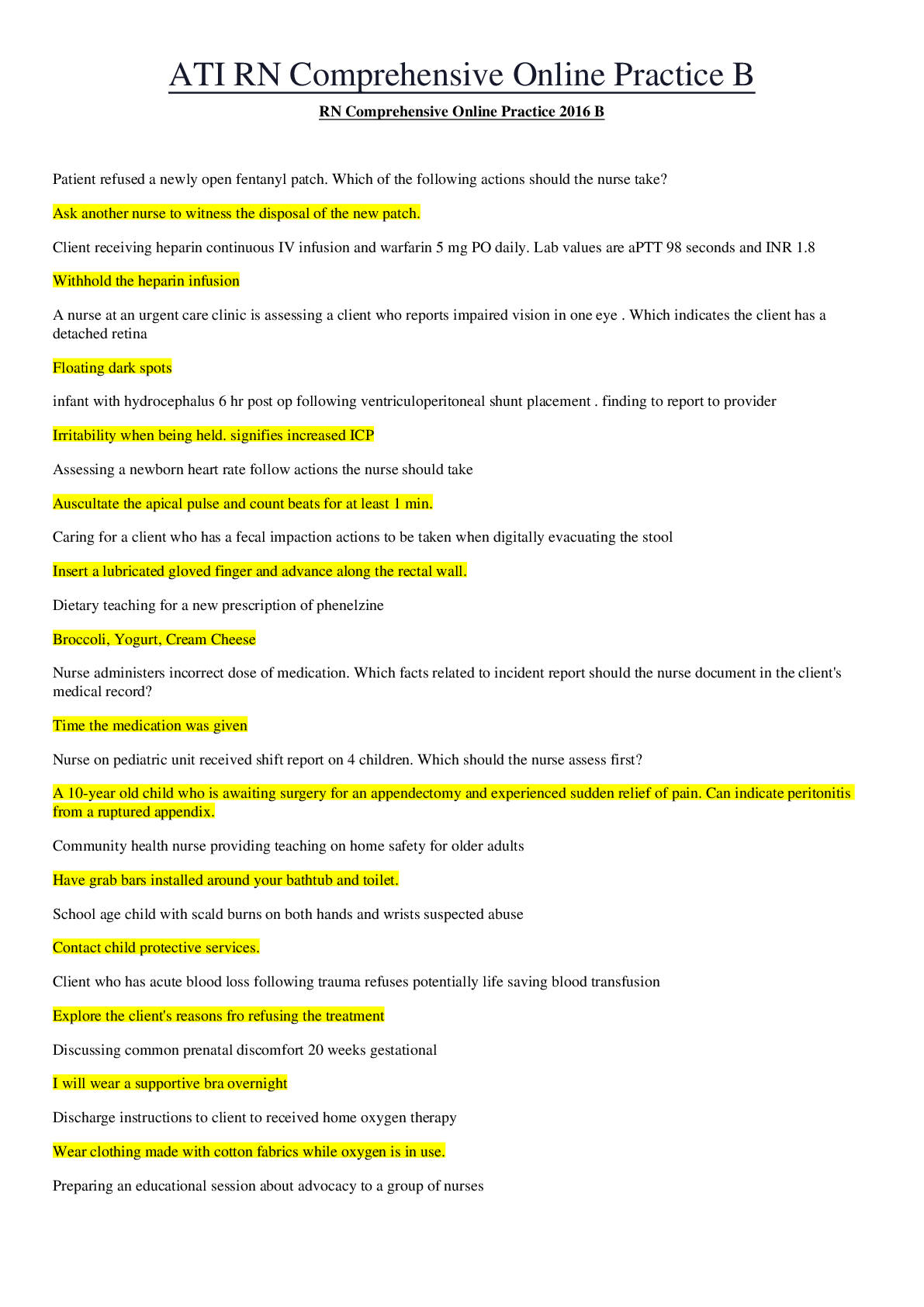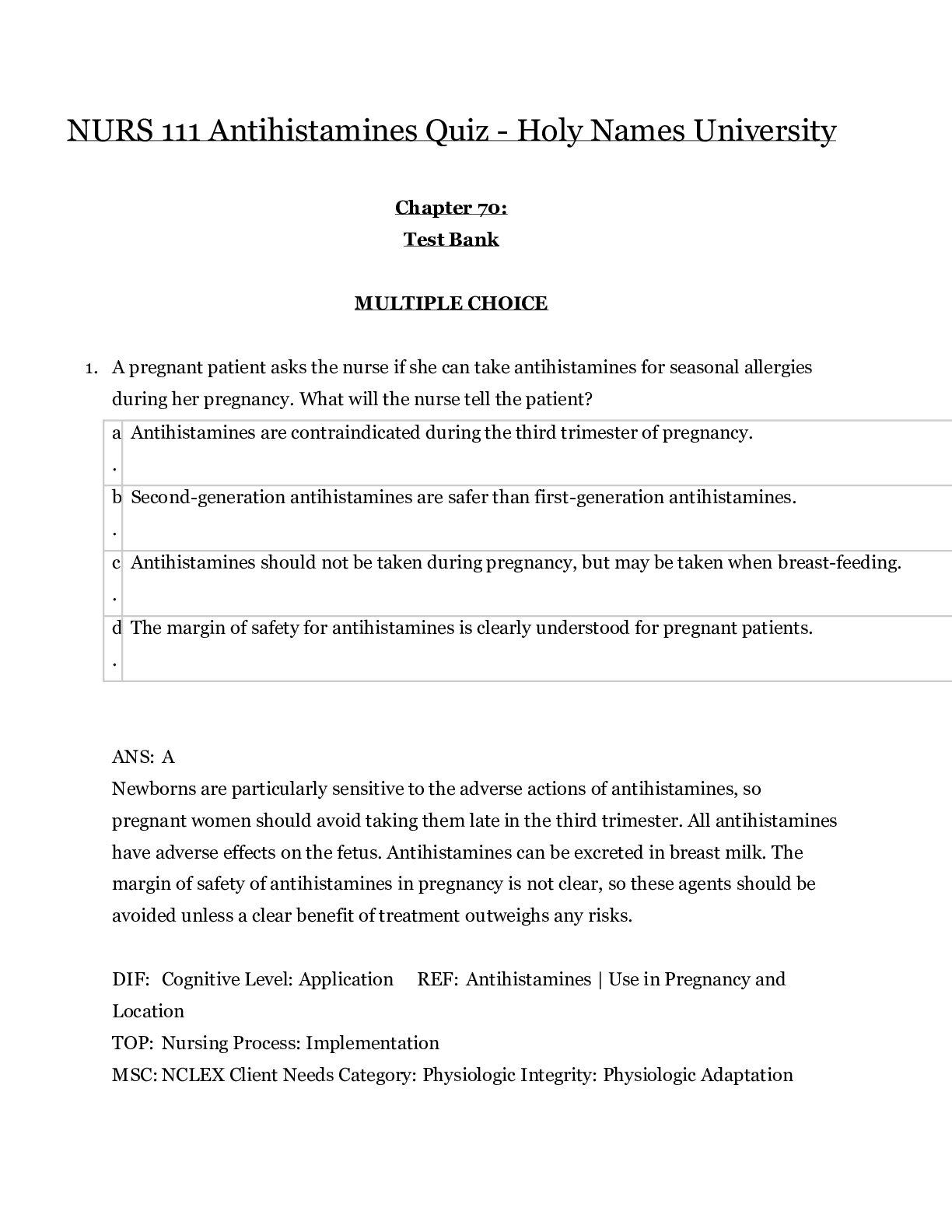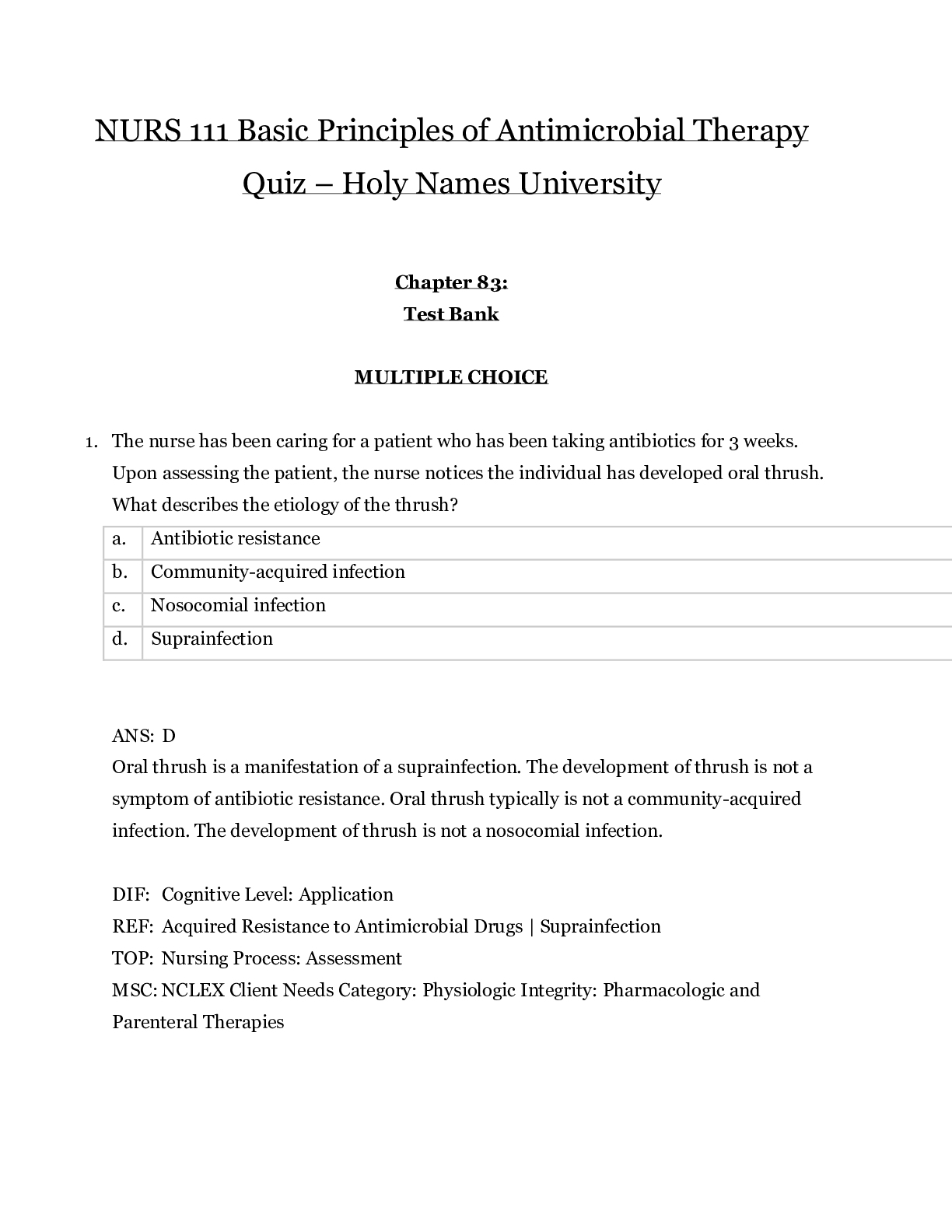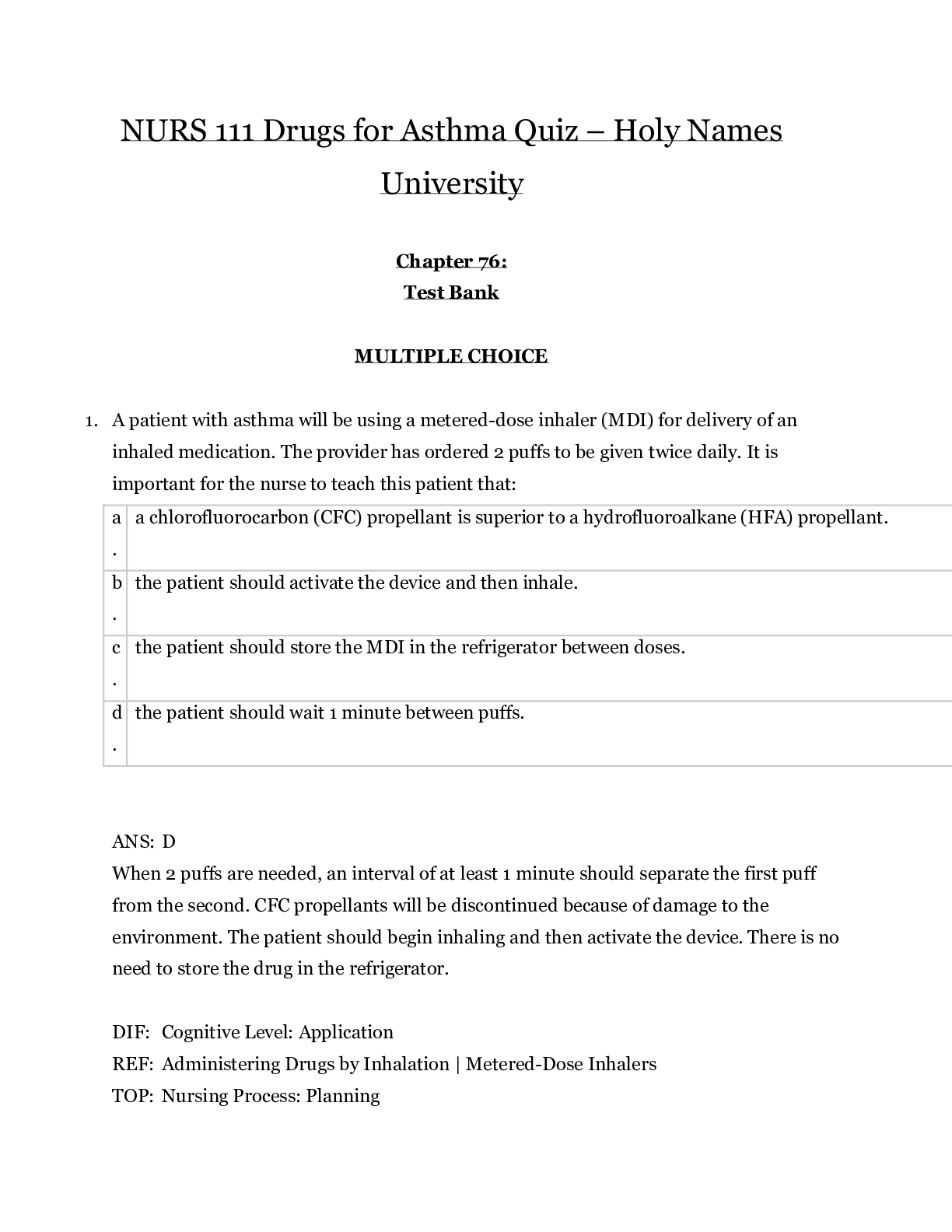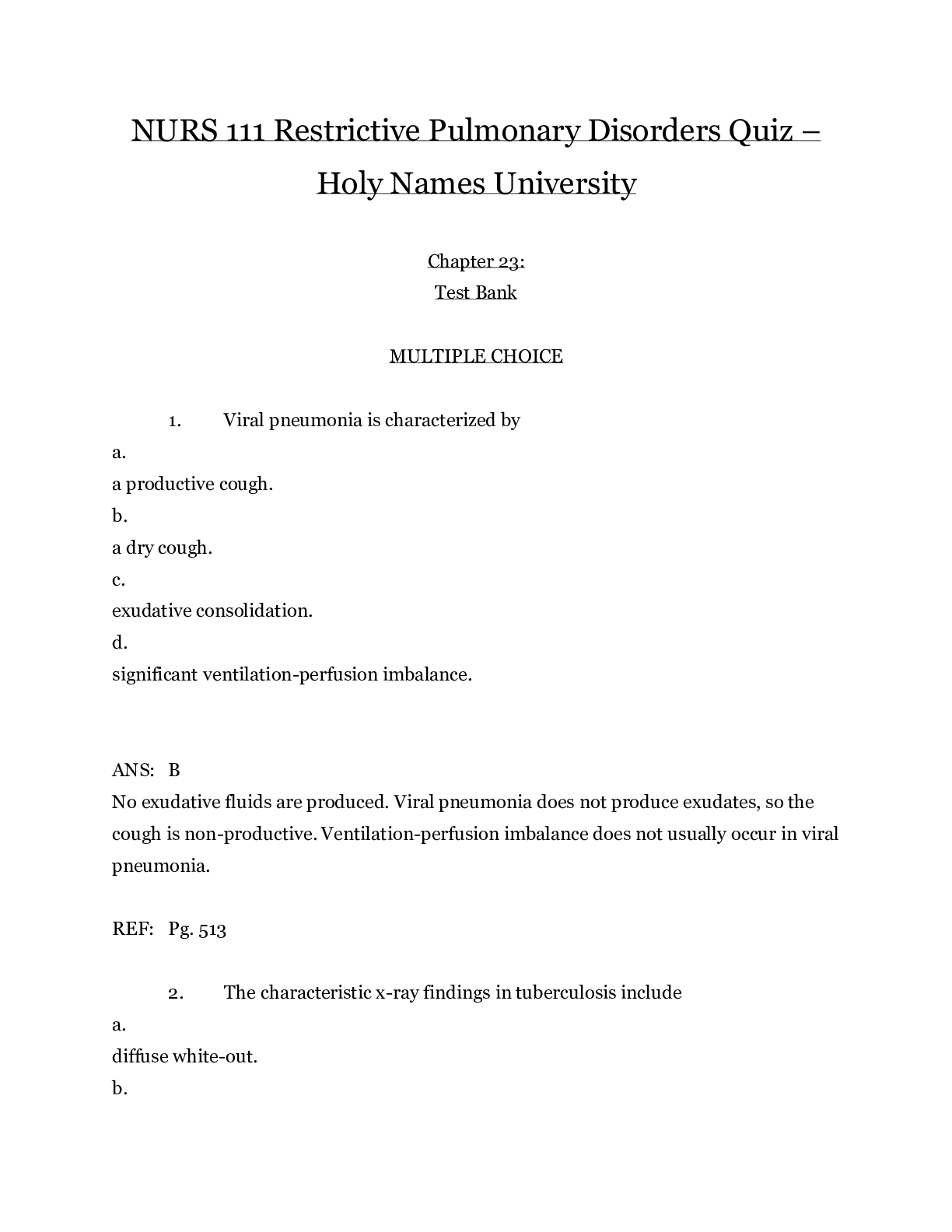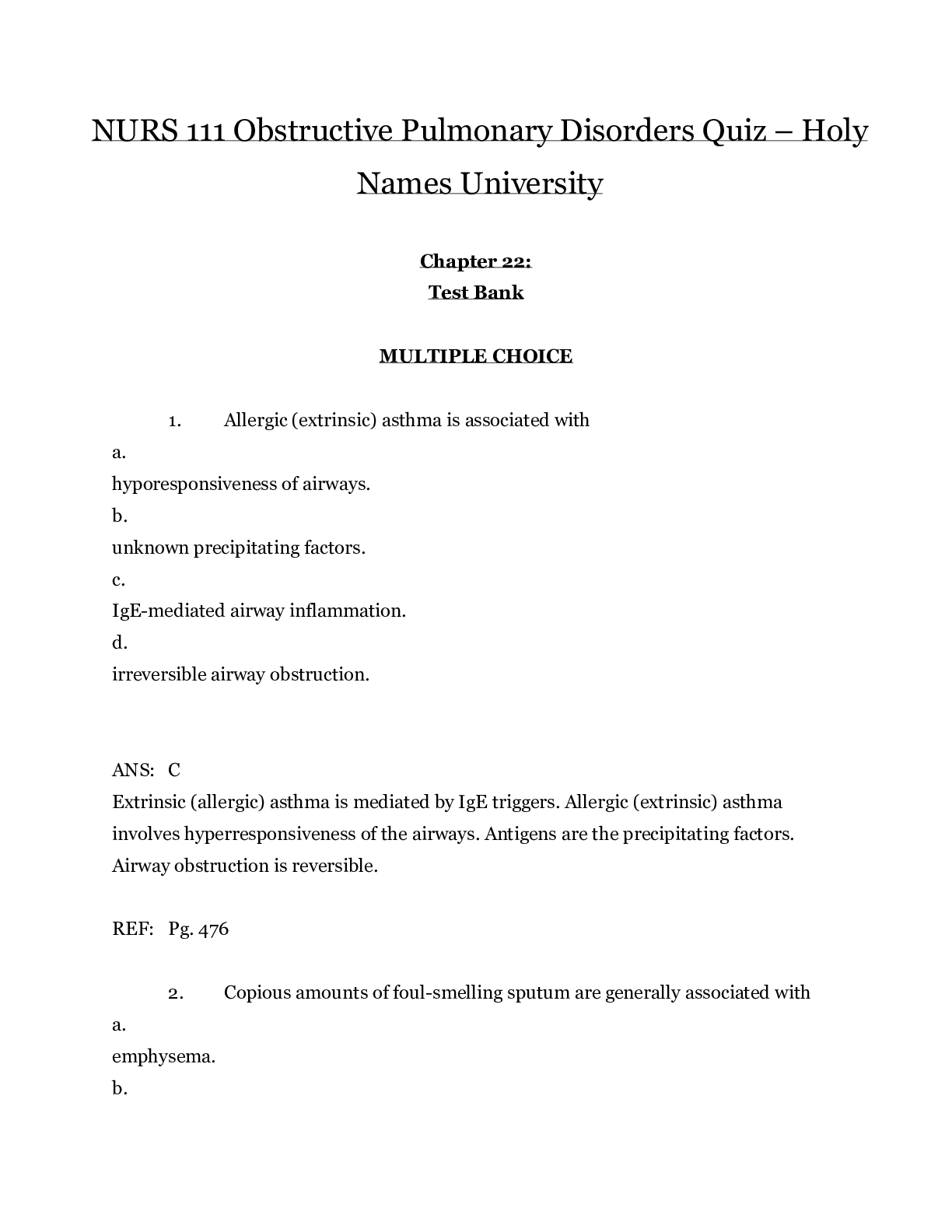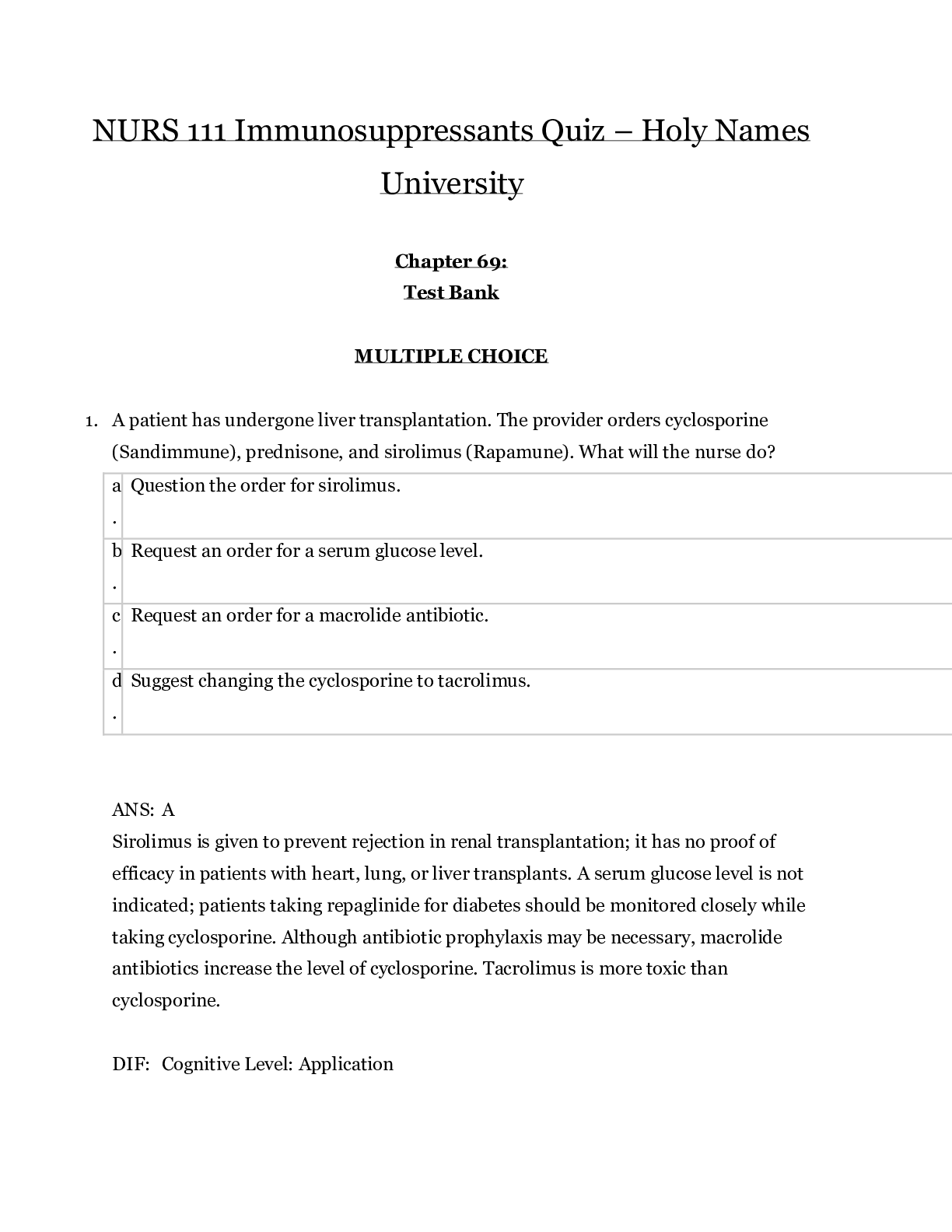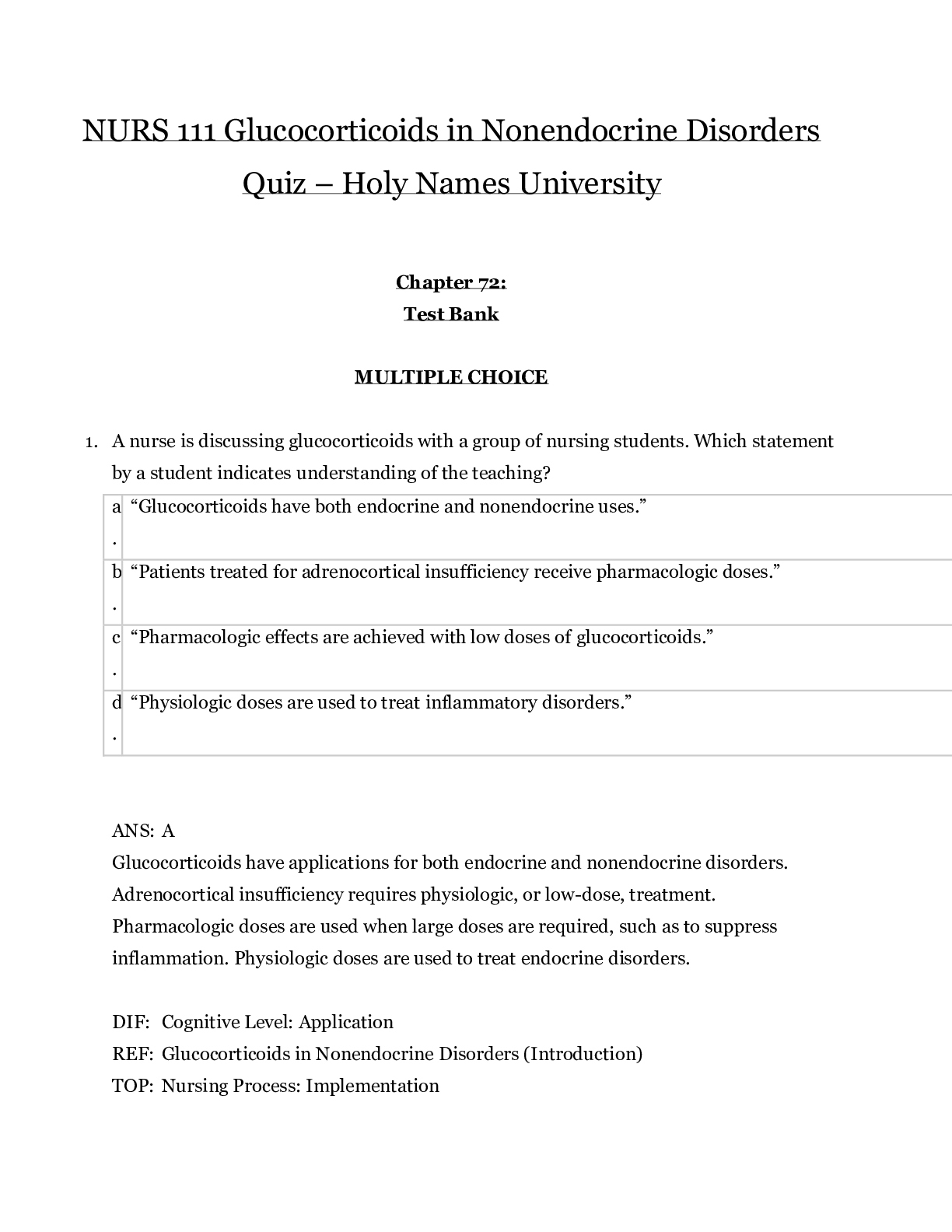*NURSING > EXAM > NURS 111 Review of the Immune System - Holy Names University | NURS111 Review of the Immune System - (All)
NURS 111 Review of the Immune System - Holy Names University | NURS111 Review of the Immune System - A Grade
Document Content and Description Below
NURS 111 Review of the Immune System - Holy Names University Test Bank Chapter 67: MULTIPLE CHOICE 1. A nurse is reviewing the immune system with a group of nursing students. One student as... ks about the difference between cell-mediated immunity and humoral immunity. What does the nurse reply? a. “Humoral immunity does not involve helper T cells in the immune response.” b. “Humoral immunity does not have a role in hypersensitivity reactions.” c. “Humoral immunity requires cytolytic T cells that attack antigens directly.” d. “Humoral immunity uses cells produced by B lymphocytes in the immune response.” 2. A nurse is teaching a nursing student about a specific acquired immunity system. Which statement by the student indicates a need for further teaching? a. “Cell-mediated immunity and humoral immunity are both types of specific acquired immune responses.” b. “Each exposure to an antigen causes a faster, more intense response.” c. “Immune responses occur only after exposure to a foreign substance.” d. “The skin is a factor in specific acquired immunity.” 3. A nurse is caring for a patient infected with the human immunodeficiency virus (HIV). Which finding would most concern the nurse? a. High level of macrophages b. Low neutrophil count c. Low red blood cell (RBC) count d. Very low helper T lymphocyte count 4. Which statement is true about helper T cells? a. They are useful but are not essential to immune responses. b. They do not play a role in antibody production. c. They have highly specific receptors to antigens on their surface. d. They prevent CD4 molecules from attaching to antigens. 5. A nurse is caring for a patient who has undergone organ transplantation. Because the sequence of amino acids in the major histocompatibility complex (MHC) molecules of the donor are different from those of the patient, the nurse will expect to administer which class of drugs? a. Antibiotics b. Antihistamines c. Immune globulins d. Immunosuppressants 6. A nurse is teaching a group of nursing students about antibodies. The nurse correctly explains that which type of response is triggered when antigens bind to antibodies on mast cells or basophils? a. Acquired immune response b. Autoimmune response c. Hypersensitivity reaction d. Transplant rejection 7. A nurse is teaching a group of nursing students about immunoglobulins. Which statement by a student indicates a need for further teaching? a. “IgD provides a first line of defense against microbes entering the body through the lungs.” b. “IgE plays a role in hypersensitivity reactions and responses to parasites.” c. “IgG and IgM participate in the complement response to promote target cell lysis.” d. “Neonatal immunity is the result of IgG crossing the placenta.” 8. A patient who breast-feeds her infant asks the nurse about the immunity the infant receives from breast milk. What does the nurse tell the patient about immunity through breast-feeding? a. “The immunity protects the infant from hypersensitivity reactions.” b. “The immunity provides phagocytes to help the infant fight infections.” c. “The immunity results from the transfer of IgA through the breast milk.” d. “The immunity protects the infant from respiratory and gastrointestinal (GI) microbes.” 9. A nurse is discussing the role of antibodies in the complement system with a group of nursing students. Which statement by a student is correct? a. “Antibodies activate the complement cascade by turning on the alternative pathway.” b. “Antibodies that are free in solution can activate the complement system.” c. “Antibodies flag target cells to be lysed by membrane attack complexes.” d. “Antibody receptors are nonspecific to antigenic determinants.” 10. A patient has a delayed-type hypersensitivity response to an infection. The nurse understands that which two types of cells are necessary for this response? a. Antigen-presenting cells and mast cells b. Cytolytic T lymphocytes and target cells c. Immunoglobulin cells and dendritic cells d. Infected macrophages and CD4 helper T cells MULTIPLE RESPONSE 1. Which immune responses can result in harm to the body? (Select all that apply) a. Activation of the complement system b. Autoimmune response c. IgE binding to mast cells and basophils d Opsonization e. Recognition of MHC molecules as nonself [Show More]
Last updated: 2 years ago
Preview 1 out of 10 pages
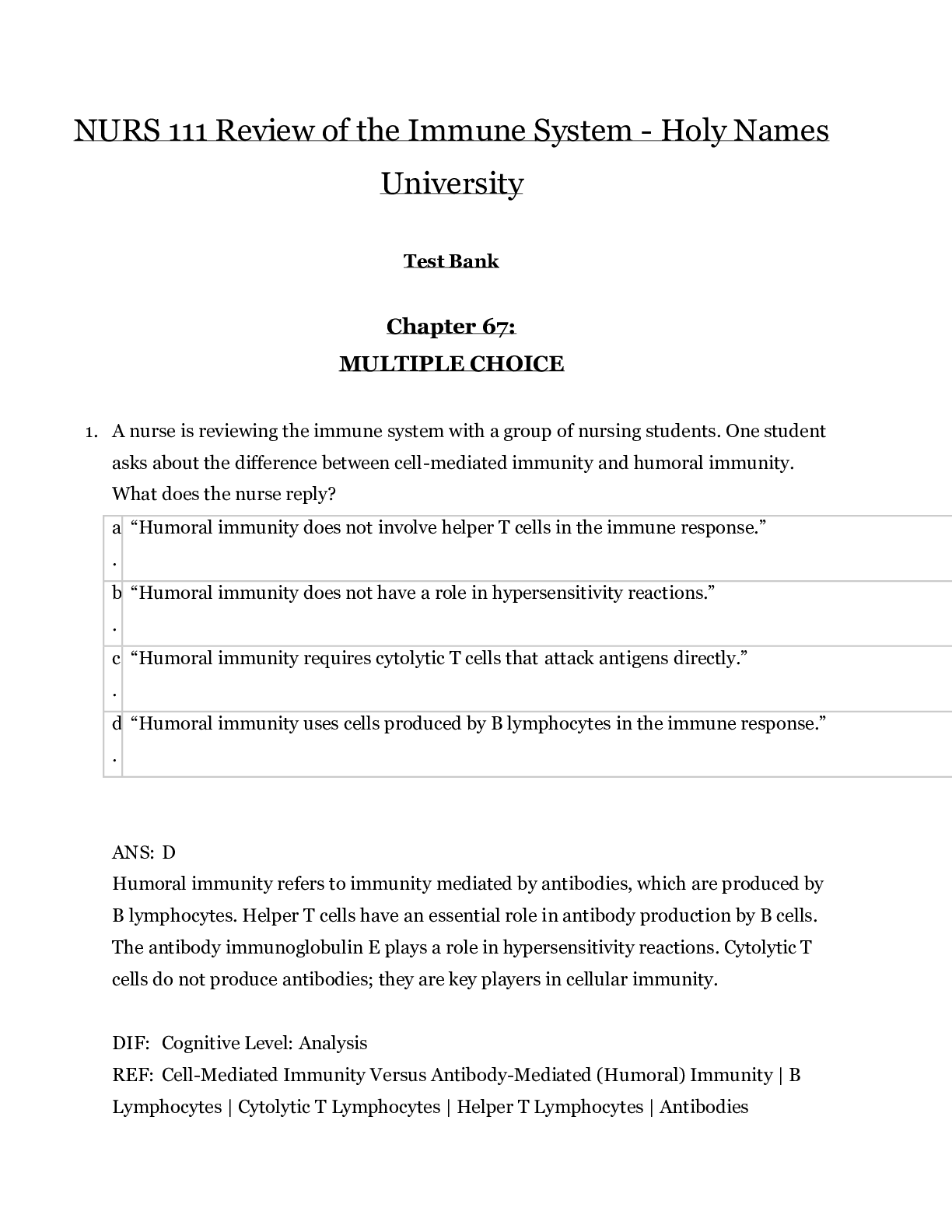
Buy this document to get the full access instantly
Instant Download Access after purchase
Buy NowInstant download
We Accept:

Reviews( 0 )
$12.50
Can't find what you want? Try our AI powered Search
Document information
Connected school, study & course
About the document
Uploaded On
Jan 23, 2021
Number of pages
10
Written in
Additional information
This document has been written for:
Uploaded
Jan 23, 2021
Downloads
0
Views
99






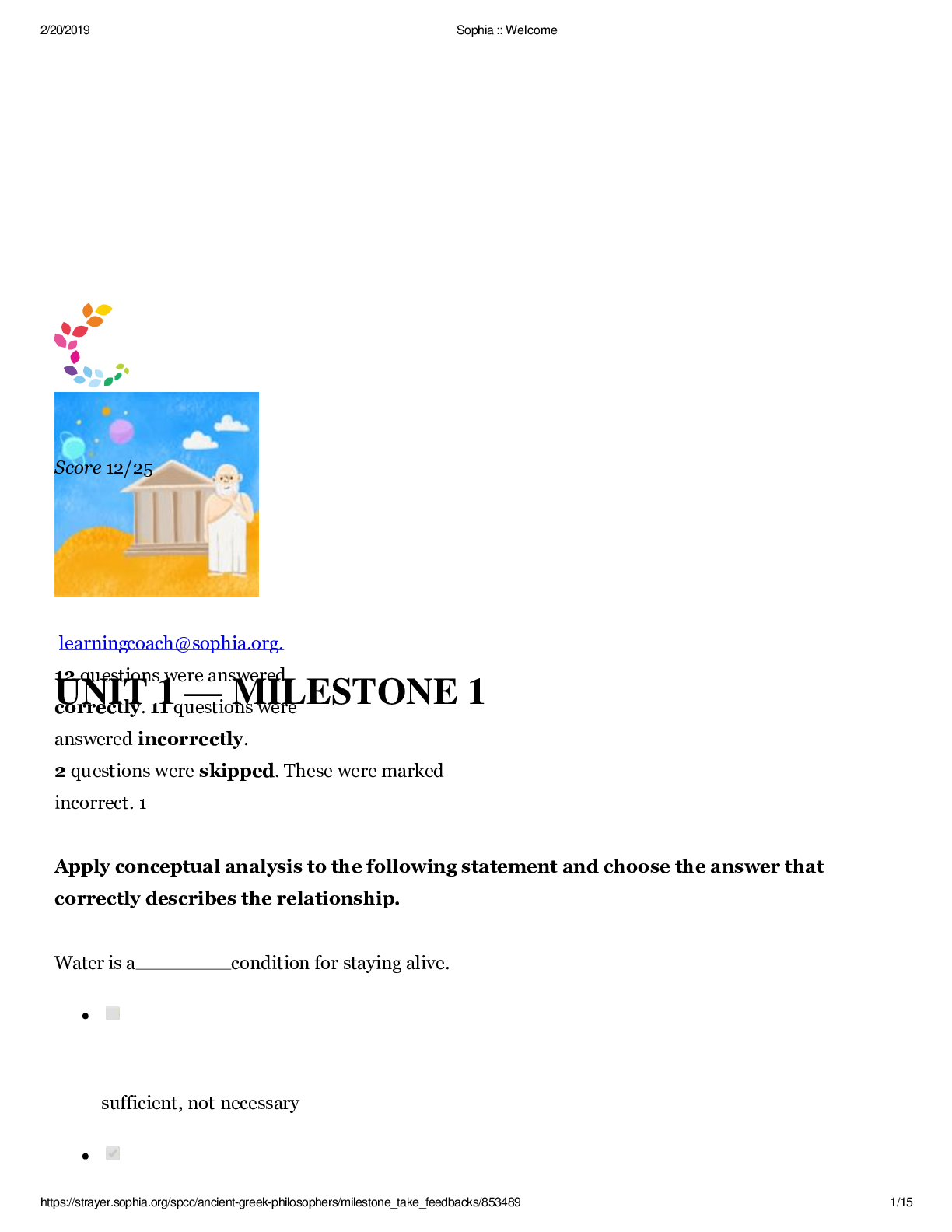


 – University of the People.png)
